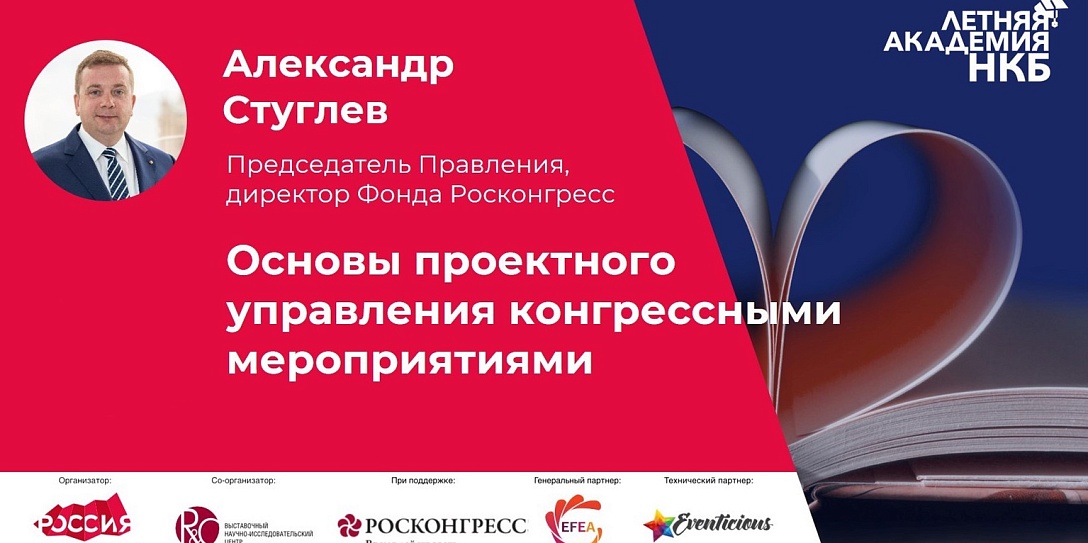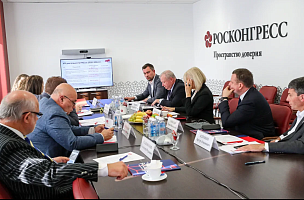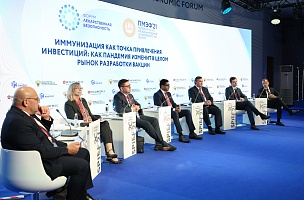Alexander Stuglev, CEO and Chairman of the Roscongress Foundation gave
an online lecture for the event industry professionals. The lecture entitled
‘Fundamentals of Project Management for Congress Events’ was given as part of
the National Congress Bureau (NCB) Summer Academy and started its second
education module.
CEO and Chairman of the
Roscongress Foundation shared some of his key practical skills accumulated over
the years of organizing congresses and exhibitions on a global scale.
250 attendees had an opportunity to learn the unique essence of project
management and how it helps adapt to practically any changes. Basic features of
any given project, such as unique results, limited timing, multiple risks, and
workgroups’ mobility allow project management to become an instrument that
drives change.
“A paramount component for any event is to define the goal of the entire
project. Many years ago, we have decided for ourselves that our primary goal is
a happy participant. This fairly general term defines a participant who has
completed a project with us, who has achieved certain satisfactory results, and
who will come back next year, possibly as a sponsor. A happy participant
attests for an event’s quality and drives the reputation of the event’s
organizers,” noted
Mr. Stuglev.
The speaker elaborated on a
multifaceted project ecosystem, where a team is the main link. Responsible and
motivated workers keep a project on track, maintain the required quality level,
and fulfil all obligations to the customer and to the participants. Thus, the
head of a project has to put together a team and establish communication both
between team members within, as well as with participants and customers on the
outside. Modern technology makes all communication fast and easy, thus any
chosen digital environment will only improve the event. Among other things, a
well-functioning communication system facilitates reacting to mistakes made
during the planning stages in a timely and efficient manner.
The lecture covered a topic that is indispensable for any efficient
project management: which criteria are adequate for measuring the
successfulness of a project, a programme (a group of projects and
subprogrammes), or a portfolio (a set of programmes, projects and operations)?
Key performance indices for an event project include timely delivery (the most
basic principle), adherence to the initial budget, and customer satisfaction in
terms of content, quality, and business accomplishments. Additionally, it has
been noted that a successful programme requires profit, whereas a successful
portfolio requires the fulfilment of strategic goals.
“Evidently, our annual programme is successful when the year is
profitable. It comes from the project profitability and we do not want to lose
money on any project, yet it is important to note that profit itself is never a
driving force for us. It is important to look at the project in terms of
quality. Our main task is to deliver an event that is up to its promised
quality level for the happy participants. Name is more valuable than money. A
participant does not care at all how much money have you spent on preparing and
holding the event. They care about results and this is our responsibility,” said Mr. Stuglev.
During the question and answer part of the lecture, Alexander Stuglev
spoke about the quality control feature that has been a mainstay on all
Roscongress events for years. The tool is making the entire participant journey
yourself, all the way from the entrance and registration and seeing everything
the participant will see, how convenient and how fast all of it is. It allows
to identify the improvement points so that the participants feel comfortable
throughout their entire time at the venue.
Mr. Stuglev spoke about the importance of the project office and the
need for a business plan behind any and every event. Additionally, all stages
of preparing a project have been spoken of, including defining goals for a
project, laying out a project, fulfilling a project, and summary and evaluation
a project (according to Maarten Vanneste’s IDEA). A great deal of attention was
paid to planning: “The more time you spend on planning and on understanding
the required tasks, the more you formalize the processes – the smoother the
actual event is going to be.” It has been noted that a project is evaluated
differently at various stages, so it is important to account for both
short-term and long-term results of every event.
Wrapping up the lecture, the speaker noted that the event industry is
prone to change, event management tools are transforming, and new communication
formats appear. Projects today usually combine both online and physical format.
It is tempting to say that such events are easier to run and commercialize, yet
the organizers’ task only gets more complicated: now they need to compete with
popular online platforms, as well as to attract – and most difficulty to hold –
the attention of a large audience in a single moment. All of the above allows
to develop and perfect the event industry tools, while looking for new answers
to the challenges of today.
NCB Summer Academy was successfully launched on 29 June with support
from the Roscongress Foundation. Leading industry professionals, experts, heads
of largest event-industry companies in Russia share their experience with the audience.
The latter includes both novice and experienced industry workers seeking new
knowledge and competences to implement in their practice.
10 July at 11:00 Deputy CEO and Programme Director of the Roscongress Foundation
Armen Khachatryan will continue the NCB Summer Academy study programme with a lecture entitled ‘Designing
an Event Programme and Key Aspects of Working with the Speakers.’ The
academy’s audience will have a chance to learn about the key component of each
event and about main principles of putting together a programme and list of
speakers that ensure the success of a future event.
The recording is available at the Roscongress
Foundation's YouTube channel.
Subscribe to the Roscongress Foundation's
official Telegram channel: news, analytics, opinions,
highlights of the Russian and international agenda, summaries of the Foundation’s
business, cultural, and sporting events.






